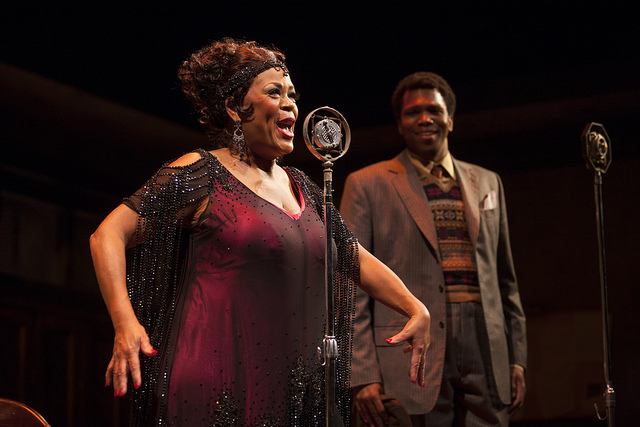
Yvette Freeman and Corey Allen in August Wilson’s MA RAINEY’S BLACK BOTTOM. March 9 – April 8, 2012 at the BU Theatre. huntingtontheatre.org. Photo: T. Charles Erickson.
Ma Rainey’s Black Bottom by August Wilson, Huntington Theatre Company, 3/9/12-4/8/12, http://www.huntingtontheatre.org/season/production.aspx?id=10262&src=t.
Reviewed by Becca Kidwell
(Boston, MA) Music breathes and pulses as each note is played. The blues provide a voice for the inexpressible feelings of the human experience. The blues celebrate the good, the bad, and the ugly parts of life in its entirety; it is neither surprising that the blues came out of the African American spiritual tradition, nor that soul, r&b, and hip-hop were derived from the blues and at the core of the best is the heart and soul of the artist. What happens when that soul is taken away? Can the heart survive?
This question permeates the existence of each of the characters in August Wilson’s play Ma Rainey’s Black Bottom. If you are brave enough, you can feel the live for a while in these 1920’s musicians’ lives, hoping upon hope for the best, grasping at anything to survive, holding your breath when the pain is too much, and for most moving on through this incomprehensible puzzle of life at Huntington Theatre’s production of August Wilson’s first play in his “century cycle.”
Ma Rainey, played by the beautiful and talented Yvette Freeman, is one of the first African-American recording artists in history. But she has no illusions of why she gets to record; she has a unique sound that people are wanting to hear and that no white person can possibly replicate. She only has power through her singing, so she makes her agent and the producer beg to get her to sing, push them to let her nephew record the introduction for the song, and make sure her loved ones are taken care of. To the best of her ability, as an African-American in America in the 1920’s, she maintains control over her life. The only time she shows vulnerability is in the “empty places” when no music is being played. She has learned to express her life through music, allowing every emotion to flow through her as she lives each day with the sorrows and the joys, the anger and the elation. But this is not her story…not really…

Glenn Turner and Jason Bowen in August Wilson’s MA RAINEY’S BLACK BOTTOM. March 9 – April 8, 2012 at the BU Theatre. huntingtontheatre.org. Photo: T. Charles Erickson.
Ma Rainey is in control and the only conflict she really has is how long it’s going to take everyone else to comply. Levee (Jason Bowen), on the other hand, has a lot to learn. Levee is a sensitive young man and trumpet player who wants to write his own songs and have his own band. He sees Rainey’s band as a stepping stone to becoming respected and to having control over his own life. And through his music, he might not be too far off, but he doesn’t learn from the lessons of his own tainted childhood or the abused lives of other “colored” folk that surround him in his life. He talks about selling his soul to the devil, and when he shares his music with Mr. Sturdyvant (Thomas Derrah), he does but he doesn’t see the danger.
His band mates try to warn him, particularly the gentle, wise piano player named Toledo (Charles Weldon) who is as much a philosopher as Socrates ever was. Toledo tells a story about how he didn’t really see what was in front of him and lost what was dear to him. He says everyone’s a fool, but there are two types: those who learn from their foolishness and those who don’t. He tries throughout the play to get Levee to really listen, but all Levee can see is his dreams and not the demons lurking in the shadows. We can’t blame Levee, because most of us go through a phase where we think we know everything and don’t want to listen. But maybe, when you get hurt, you should take a moment or two to see how it happened.
Jason Bowen is brash, arrogant, yet charming Levee who seems to have the whole world seems to have the whole world in front of him. Like a child, he sees what he wants and goes after it without thought or consideration of anyone else. Bowen provides the right balance between cockiness and wounded child whose mother was raped in front of his eyes. He can’t understand why the world is such a cruel place and thinks he’s finally gaining some control over his life. Bowen plays these complexities like he plays the trumpet, with style, and can be looked at as the equivalent of the Greek tragic heroes.
Yvette Freeman’s performance as Ma Rainey is formidable and even crushing. If I met her Ma Rainey, I would definitely do everything I could to stay on her good side, because she won’t take any nonsense from those around her–even though several try. She knows who she is, knows what she wants, and does not let anyone get in her way. To digress slightly, while she is not the main focus of the show, Wilson has written a wonderfully strong female role, and this is a great character for women to see. Freeman soaks up all the juiciness of this role and takes no prisoners as she arranges the world around herself.
The entire supporting cast provide the harmonies and counterpoints that produce a play that is an entire blues song in itself. Charles Weldon steals hearts as the lovable, philosophical–sometimes too philosophical–Toledo. Weldon shows that Toledo has lived life fully through the tears and the laughter and appreciates every moment of his existence. Cutler (G. Valmont Thomas) and Slow Drag (Glenn Turner) round out the band. They provide the pendulum from which Levee and Toledo can bicker from. Along with Freeman, they display their depth of talent not only as actors, but also as musicians.
Sturdyvant (Thomas Derrah), Irvin (Will LeBow), and the policeman (Timothy John Smith) clearly ring through as the voice of white oppression. Their characters never have any consideration for Ma Rainey or her band except in terms of how they can benefit by using this group of people, Sturdyvant and Irvin through money-making and the policeman through trying to bring false charges against Ma Rainey and her nephew. These three white characters prove that Ma Rainey is smart and self-sufficient.
Corey Allen plays the sweet, stuttering Sylvester whose character basically shows how Ma Rainey takes care of her own and uses the power she has to help them out as well. Joniece Abbott-Pratt plays the young, delightful Dussie Mae, who is Ma Rainey’s girlfriend. While her character provides a small amount of additional conflict and an additional female to the mix, but that’s as far as August Wilson went with her. While these characters remain in the periphery, Allen and Abbott-Pratt do add to the atmosphere of the main story.
Both acts open up with a hip-hop song and the young actors looking out into the world (for act one they are in modern day clothes). While Liesl Tommy’s directorial choice may seem disjointed, it brings the story out-of-the past into the present. Have we learned from our forefathers/mothers’ failure or are we living in the same cycle of cruelty that has existed since the world began? Can we learn to live in the song and embrace every moment of life or are we going to throw it away for a trifle that doesn’t matter in the grand scheme of things? While this play addresses race, it is not a play about race; it is a play about the human heart and the choice we make to live or die each day.
